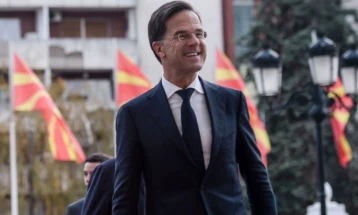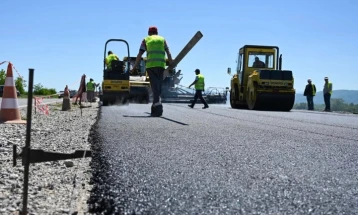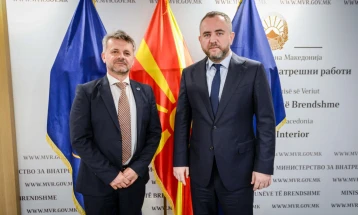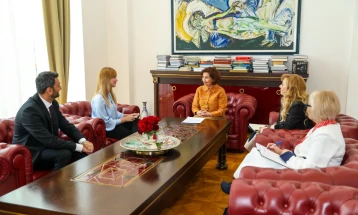Pendarovski says reassured that Greece respects Prespa Agreement, wants full implementation
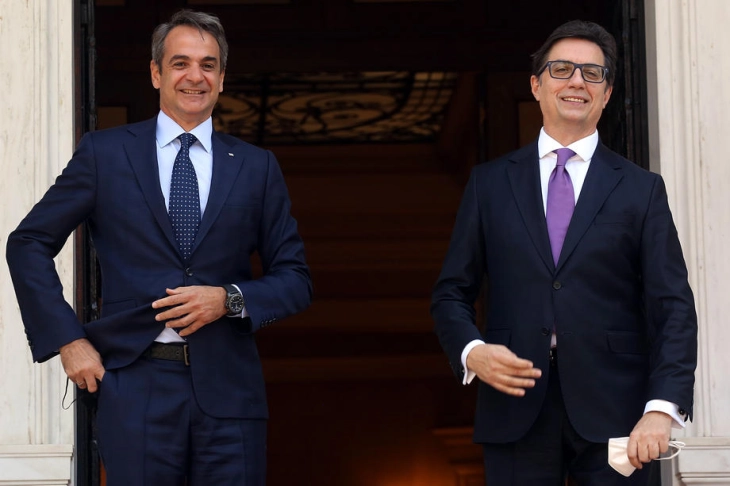
Athens, 5 October 2021 (MIA) – I was reassured at the meetings that the Prespa Agreement would be respected, irrespective of the positions by some in the years before, that it is valid and that they want its full implementation, President Stevo Pendarovski told Macedonian media outlets after meetings with Greek top officials, MIA reports from Athens.
Along with the confirmation he received from the Greek interlocutors, President Pendarovski also highlighted North Macedonia’s commitment for the full implementation of the Agreement “to the last point”, while agreeing with Greek counterpart Sakellaropoulou, considering they are both jurists, “that agreements must be kept, protected and implemented.”
“We are absolutely serious in this regard. We have a clear political intention to implement everything written in the Agreement, and in this sense I have asked for more action regarding certain components of the Prespa Agreement, which have been on stand-by due to the covid-pandemic. This relates to the two commissions that have been set up and a Council focusing on evaluation of achievements. The inter-governmental council carried out such evaluation in 2019 but there has been none since,” said Pendarovski.
On the commissions on trademarks, and educational, historical and archaeological matters, he reiterated that dates have been put forward for the commissions to start meeting again after a year-and-a-half hiatus.
He said the commission on educational, historical and archaeological matters had held six meetings before the pandemic, with four minutes already adopted, aligned and signed by both parties, while the remaining two would also be aligned and signed by the end of the year, provided the announced meeting took place.
The meetings also tackled the implementation of the Prespa Agreement on the part of Greece, namely the change of traffic signs in the country. Pendarovski said the issue has also been discussed with the Greek Ambassador to Skopje, and the explanation is identical, saying, “the signs at the border crossing have been changed, but not those in the country itself, because this is, as they say, in the jurisdiction of the municipalities.”
Regarding the three memoranda still not ratified in the Greek parliament, the President said the explanation he got from his interlocutors was, “the domestic political dynamics of Greece is specific due to internal developments and constellations, and the ratification of these agreements will depend primarily on this.”
“The PM, who is supposed to submit them to the Parliament for ratification, asked for patience. He said they do not have any political reason to undermine the Prespa Agreement and they will be submitted for ratification at the earliest favorable opportunity. Therefore, they do not intend to obstruct the Agreement or bilateral cooperation with the Republic of North Macedonia. It mostly depends, I quote, ‘on the internal political dynamics in the Hellenic Republic,” explained the President.
We expect Greek support at EU-Western Balkans Summit
The EU-Western Balkans Summit was also in the focus of the talks, considering that PM Mitsotakis left for Slovenia right after the meeting.
“I asked him as an influential member of the European People’s Party and a Prime Minister of a member-state, which should be aware of the whole title of the Prespa Agreement that not only resolves the name differences but also establishes strategic partnership between North Macedonia and the Hellenic Republic. We expect his support and assistance with those representatives of member-states that are still skeptical, primarily Bulgaria, and of course others who would possibly have negative remarks over the second country that is part of our package, Republic of Albania,” explained Pendarovski.
The President did not ask for guarantees or promises, since this did not depend on the Greek PM.
“However, he clearly stated that he had done this before and will continue to do, mentioning several influential politicians from EU member-states who are not directly involved in the dispute but could be influential in the background, and try to explain the reasoning at this pan-European meeting on why the Western Balkans should generally move closer to Brussels but is not doing this at the moment,” said Pendarovski.
Sofia dispute should be solved bilaterally
On the situation with Bulgaria, he explained the dispute should be solved bilaterally.
“The Skopje-Sofia dispute should be solved bilaterally and all others should create an environment where all EU member-states would be clear with the fact that North Macedonia and the Western Balkans’ integration in the Union has become a geostrategic issue, and that is why Brussels political circles feel the added weight of knowing there should be no more waiting, since there are other regional players, entities that promote different political models and governance. We should not allow for alternatives to the European and Euro-Atlantic values,” said the President.
He added there is communication between the countries’ ministries of foreign affairs, although Bulgaria has a caretaker government and is again amid an election campaign, while not excluding the possibility of a meeting between Macedonian and Bulgarian officials at the summit in Slovenia.
“What is important is that the EU and the Slovenian Presidency are fostering hopes and try to facilitate the work of those sitting on the table, towards finding a solution by the end of the year. If we come to an agreement with our friends in Sofia, this would be the period from 21 November-the runoff in the Bulgarian elections up to the first 10-15 days of December,” underlined President Pendarovski.
